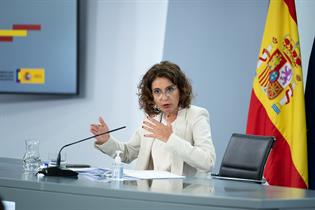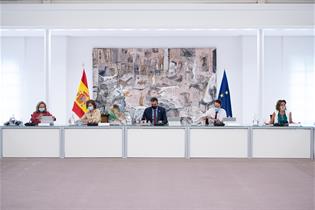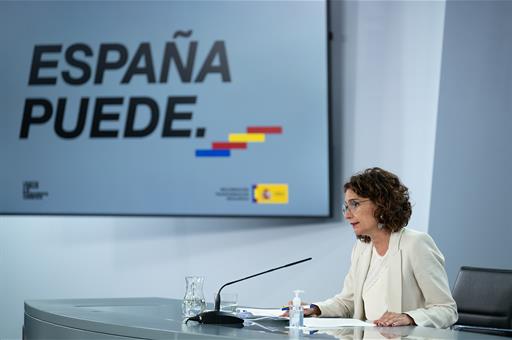Council of Ministers
Government allocates 51 million euros to 12 innovative health projects
Council of Ministers - 2020.9.1
Moncloa Palace, Madrid
The Council of Ministers approved the subscription of 12 agreements to boost innovative scientific projects in the field of health. Through the ERDF European funds, the Ministry of Science and Innovation will allocate 51 million euros and signatory institutions will contribute a further 35 million euros.
The Minister for the Treasury and Government Spokesperson, María Jesús Montero, highlighted that these agreements will allow "some very important projects" to be developed. Among these, she underlined four in Andalusia, Madrid, Castile La Mancha and the Canary Islands, that seek to respectively improve mobile attention in cardiovascular emergencies, diagnostic imaging devices, homecare monitoring of the elderly and vulnerable and the new model of clinical records.
2,700 contracts at Educational Workshops, Trade Schools and Employment Workshops
The government agreed to call a round of proposals for subsidies to finance education programmes at Educational Workshops, Trade Schools and Employment Workshops under the exclusive management of the State Public Employment Service (Spanish acronym: SEPE), in collaboration with Central Government bodies and entities.
This round of proposals, which will receive an allocation of 16.8 million euros, will allow 2,700 young people from 20 Spanish cities to be hired for a period of between six and 12 months to carry out work to recover Spanish heritage.
The Government Spokesperson explained that these initiatives, which integrate training and work, seek to improve the employability of the unemployed and that experience shows how beneficial they are: "70% of those who took part in previous rounds ended up by finding a job, hence the priority and importance of this new round".
18.2 million euros in subsidies for high-performance athletes
The Council of Ministers authorised the National Sports Council to call rounds of proposals for subsidies for high-performance Spanish athletes, for a sum of 18.2 million euros.
The aim of these subsidies is for beneficiaries, through their respective federations, to cover expenses relating to their activity, such as the rental of materials or facilities, medical care and entry to competitions.
María Jesús Montero claimed that this measure explicitly seeks to support Spanish sport, which is "a source of pride", and those athletes that are leading Spanish representatives on the international stage.
COVID-19 report: more than 50% of cases are asymptomatic
 Pool Moncloa/Borja Puig de la BellacasaThe Minister for Health, Salvador Illa, reported to the Council of Ministers on the evolution of the COVID-19 pandemic. The epidemiological data and the increase in the number of people infected, said María Jesús Montero, must serve to keep the public authorities and individuals "alert and vigilant" even though the current situation is not the same as between the months of March and June.
Pool Moncloa/Borja Puig de la BellacasaThe Minister for Health, Salvador Illa, reported to the Council of Ministers on the evolution of the COVID-19 pandemic. The epidemiological data and the increase in the number of people infected, said María Jesús Montero, must serve to keep the public authorities and individuals "alert and vigilant" even though the current situation is not the same as between the months of March and June.
María Jesús Montero explained that half of those who have tested positive in PCR tests are asymptomatic and have not required healthcare, and hence hospitals and intensive care units have not come under the same pressure. In fact, the number of beds occupied by COVID patients stands at around 6% of the total. Furthermore, the average age of those infected in much lower, which has reduced the mortality rate.
María Jesús Montero explained that the international community is aware of these figures and hence knows that Spain is a safe country and that the health system is "ready to deal with any eventuality". The Minister for Foreign Affairs, European Union and Coordination, Arancha González Laya, she continued, is working with her European colleagues so that this information can be incorporated within the framework of the EU, which allows the specific situation of each country to be reflected beyond merely the number of people infected.
The minister reiterated that it remains essential to respect all the preventive measures and particularly stressed that young people and teenagers must uphold preventive measures and avoid the false impression of thinking they are not vulnerable to the virus.
School year: safe and in classrooms
Given the imminent start to the school year, the Government Spokesperson sent out a "message of confidence" to families and the education community in the protocols and measures designed to be implemented to ensure education centres are safe.
María Jesús Montero announced that she will sign the Order on Tuesday that will lead to the transfer next week of 2 billion euros to regional governments to strengthen the education system. With this money, she explained, teachers can be hired, premises rented and health material acquired, "which is what they need for a normal start to the school year".
The Conference of Regional Presidents called for Friday, 4 September, will again analyse the preparations for the return of pupils to classrooms, following the Multi-sector Conference between Central Government and the regional governments held last Thursday.
Political period of sessions: dialogue, unity and new National Budget
The Government Spokesperson also highlighted on this week's agenda the round of contacts that the President of the Government, Pedro Sánchez, will maintain with political leaders. On Wednesday, 2 September, he will meet in person with Pablo Casado, from the People's Party, and with Inés Arrimadas, from Ciudadanos. On Thursday, 3 September, he will meet with the spokesperson from the Basque Nationalist Party (Spanish acronym: PNV) and with the Republican Left of Catalonia (Spanish acronym: ERC), and by video-conference with the other parliamentary groups.
 Pool Moncloa / Borja Puig de la BellacasaOne of the aims of these meetings, remarked María Jesús Montero, is to "depoliticise the fight against the pandemic", and create a new political climate that allows the socio-economic crisis to be addressed through unity. "The situation of the country is unprecedented, we need the participation of everyone and for citizens and their needs to be a priority.
Pool Moncloa / Borja Puig de la BellacasaOne of the aims of these meetings, remarked María Jesús Montero, is to "depoliticise the fight against the pandemic", and create a new political climate that allows the socio-economic crisis to be addressed through unity. "The situation of the country is unprecedented, we need the participation of everyone and for citizens and their needs to be a priority.
Another of the matters that the President of the Government will address, according to the minister, is the renewal of the governing bodies of the judiciary, the Constitutional Court and the Spanish Radio and Television Corporation (Spanish acronym: RTVE), and the Ombudsman.
The third priority issues will be the National Budget for 2021. This Budget must lay the foundations for Spain in the future, that is more productive, more inclusive, more social, more feminist and more ecological", said the Minister for the Treasury.
María Jesús Montero argued that the current Budget, from 2018, extended over the last two years, does not allow the 140 billion euros from the European Union to be passed through to the transforming projects that the country needs.
The Minister for the Treasury announced that the government will enter into dialogue with all those political formations "that seek to contribute to this economic recovery".
Extension of ERTEs (Temporary Lay-off Plans) and regulation of working from home
María Jesús Montero announced that the Ministry of Work and Social Economy will meet on Tuesday afternoon with employers' organisations and trade unions to work on regulating working from home.
A second key aspect of social dialogue, she said, will be the extension of the ERTEs beyond the date of their current validity to 30 September, to which end a meeting has been scheduled for this Friday.
María Jesús Montero argued that this instrument has been "essential for maintaining jobs during the pandemic". 3 million workers were under an ERTE on grounds of force majeure in April, and there are now around 620,000, "basically in the restaurant and transport sectors as the worst affected by the crisis until such time as full activity is recovered in the tourism sector".
Non official translation





